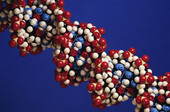
WEDNESDAY, Oct. 22, 2014 (HealthDay News) — Elderly men who’ve lost the Y chromosome from their blood cells may be at increased risk for earlier death and death from cancer, a new study suggests.
This age-related loss is common among men and could explain why men tend to die younger and have higher rates of certain cancers than women, who do not have a Y chromosome, the researchers say.
The study authors analyzed blood samples from more than 1,150 men, aged 70 to 84, who were followed for up to 40 years. Men who had significant Y chromosome loss in their blood cells lived an average of 5.5 years less than those who did not have that chromosome loss.
Also, men with significant Y chromosome loss in their blood cells had a much higher risk of dying from cancer, according to the study presented at the annual meeting of the American Society of Human Genetics, in San Diego on Oct. 21.
“Many people think the Y chromosome only contains genes involved in sex determination and sperm production. In fact, these genes have other important functions, such as possibly playing a role in preventing tumors,” study co-author Dr. Jan Dumanski, a professor at Uppsala University in Sweden, said in a society news release.
The findings suggest that a blood test to assess Y chromosome loss in men may provide a new method of early detection of cancer risk, according to study lead author Lars Forsberg, a geneticist at Uppsala University.
Y chromosome loss “is not very dangerous in a small fraction of blood cells, but becomes increasingly predictive of cancer as more cells lose their Y chromosome. This takes years, so you’d have a window of time to do something to reduce your risk,” Forsberg said.
He and his colleagues are continuing their research to see how different lifestyle factors and health conditions affect Y chromosome loss.
The data and conclusions of research presented at meetings are usually considered preliminary until published in a peer-reviewed medical journal.
More information
The U.S. Centers for Disease Control and Prevention offers tips for healthy aging.
Copyright © 2026 HealthDay. All rights reserved.

